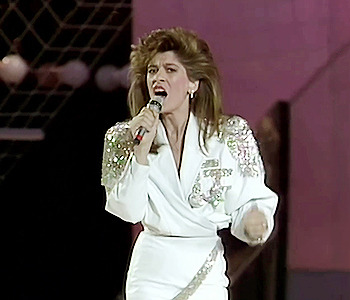#ESC 1985
Explore tagged Tumblr posts
Text
Eurovision Fact #889:

Bobbysocks, who won Eurovision in 1985 and helped Norway take home their first win, are taking part in Norway's national final, Melodi Grand Prix, this year with the song "Joyful."
This year marks the 40th anniversary of the duo's win.
[Sources]
"'Melodi Grand Prix' lineup revealed in Norway," Eurovision.tv.
Norway, Eurovision.tv.
#esc facts oc#eurovision#eurovision song contest#esc#eurovision facts oc#esc 1985#Melodi Grand Prix#esc 2025#bobbysocks
9 notes
·
View notes
Text

🇳🇴 Bobbysocks - La det swinge
#Bobbysocks#La det swinge#norway esc#esc norway#eurovision norway#norway eurovision#esc 1985#eurovision 1985#eurovision#esc#winner#now that that the 2023 contest is approaching the urge to draw this years contestant is hard to resist.... it will have to wait
82 notes
·
View notes
Text

🇵🇹 Adelaide - Penso em ti, eu sei
#Adelaide#Penso em ti eu sei#portugal esc#esc portugal#eurovision portugal#portugal eurovision#esc 1985#eurovision 1985#esc#eurovision#such a lovely song <3#I love 80s hair
15 notes
·
View notes
Note
Hi, I love your work so much :)) would it be possible to get bobbysocks' Eurovision outfits (Norway 1985)? Because those are absolutely banger outfits <3
Thank you so much and if I can find some okay footage on youtube of their performance, sure.
youtube
Usually I use the actual performance artists competed with and not a reprise but with older Eurovisions I can't really be picky. This is the best quality I found in a few minutes. Might not be the best looking gifs but I'll try.
4 notes
·
View notes
Text
youtube
"Für alle", Wind - Germany, Eurovision 1985 (preview video)
2 notes
·
View notes
Text
I think whoever hosts next year should do something similar like the host did in 1985
youtube
3 notes
·
View notes
Text

Storia Di Musica #340 - INXS, Kick, 1987
La band di oggi, a metà anni '80, era tra le più famose del mondo. Ma credo che anche all'epoca pochissima sapessero che il nucleo centrale di questo gruppo australiano fosse formato da tre fratelli. tutto inizia a Perth, nel 1979: i fratelli Farris, Tim, Andrew e Jon che avevano già un gruppo dal nome, inequivocabile, di The Farris Brothers, aggiungono al nucleo fondativo Kirk Pengilly, Garry Beers e un cantante, amico di liceo di Tim, Michael Hutchens. Si spostano a Sydney, dove cambiano nome in INXS ( da leggere come "In Excess") dove ottengono un contratto con una piccola etichetta indipendente, la Deluxe, con cui pubblicano il primo singolo, Simple Simon. Erano gli anni della pulizia dal rumore del punk, dell'arrivo della elettronica "dolce" e della new wave. È in questo solco che la band si muove, ma si apre in maniera piuttosto originale al funk e a piccoli innesti dance. All'inizio concentrano le energie nella nativa Australia, dove ottengono un buon successo con il loro primo disco, del 1980, intitolato INXS, che si ripete nel 1981 con Underneath The Colours, con la prima hit, una cover di un classico della musica australiana coverizzato, The Loved One, successo del 1966 dei The Loved Ones. Nel 1982 tentano il grande salto. Vanno in Inghilterra, dove li scrittura la WEA e la Atlantic li distribuisce negli Stati Uniti. Shabooh Shoobah del 1982 ha il primo singolo di successo mondiale, Don't Change, e il seguente tour internazionale al seguito di The Kinks e Adam And the Ants li fa conoscere in mezzo mondo. Nel 1984 ancora maggiore successo ottiene The Swing, trascinato dal singolo Original Sin, prodotto da Nile Rodgers. Il successo è sempre crescente: nel 1985 partecipano da Sydney al Live Aid, nel 1986 suonano con i Queen alla Royal Albert Hall, Hutchens addirittura esordisce come attore protagonista in Dogs In Space, film che lo vede interpretare Sam, il frontman avvezzo alla sostanze di una band post punk nel 1978 a Melbourne.
Dopo un tour lunghissimo, e con il management che ne programma uno nuovo in Europa, la band torna in studio. Guidati dal produttore Chris Thomas, uno dei grandi produttori inglesi (a lavoro con The Beatles, Pink Floyd, Procol Harum, Roxy Music, Badfinger, Elton John, Paul McCartney, Pete Townshend, Pulp, The Pretenders) le prime prove avvengono addirittura nella spettacolare Sydney Opera House. Il suono è più maturo, gli innesti da altri generi eclettici, i riff invidiabili e la voce di Hutchens è ormai una garanzia. Thomas però vorrebbe più canzoni, anche in previsione dell'atteso e imminente tour europeo, quindi manda Hutchens e Andrew Farris a Honk Kong, dove i due acquistarono un appartamento. Un giorno, mentre è in attesa di un taxi, a Andrew viene in mente una melodia, proprio mentre il taxi è arrivato. Chiede al tassista di aspettarlo cinque minuti, ma lui sale nel suo appartamento, scrive e registra i demo di una canzone, la riporta sulla cassetta e 45 minuti dopo, nonostante la furiosa cazziata del tassista, la porta a Hutchens che lo aspettava in un bar, e in dieci minuti ne scrive il testo, per quello che sarà il singolo di apertura, e hit mondiale, del nuovo disco.
Kick esce il 19 ottobre del 1987, un mese prima, il 21 Settembre, fu preceduto da quella canzone: Need You Tonight, dal ritmo funky, la voce sensuale di Hutchens e un bellissimo video musicale (che vinse nel 1988 5 MTV Video Music Awards) trascinano il brano in cima alle classifiche (primo negli Stati Uniti e secondo in Gran Bretagna) e proietta il disco e la band in una nuova dimensione. Tutte le canzone sono scritte dal duo Hutchens - Andrew Farris, che mediano tra il suono molto funk dei primi dischi a quello mainstream rock dei primi dischi a distribuzione internazionale. Più che altro, hanno il tocco magico di scrivere canzoni che diventano famose per come rimangono in testa: New Sensation, Devil Inside, Mystify, la toccante Never Tear Us Apart, la ripresa di The Loved One ne fanno un disco di grande qualità e di grande successo, con una serie di ganci musicali memorabile. Il disco venderà milioni di copie e li fa diventare rockstar.
Arriveranno anche al Festival di Sanremo del 1988, però perdono il tocco magico: nonostante tour seguitissimi, in studio perdono la magia e X (1990) e Welcome To Wherever You Are (1992) sono accolti con freddezza e non regalano grandi canzoni. Parallelamente, Hutchens diventa molto più famoso dell'intera band, complice anche la relazione con Paula Yates, giornalista musicale famosa per le sue interviste particolari fatte in programmi come The Tube o The Big Breakfast, dove intervistava gli artisti in un letto e dal 1986 al 1996 moglie di Bob Geldof. Hutchens pensa ad una carriera solista, ma il 22 novembre del 1997 viene trovato morto impiccato in una camera di Hotel in Australia. In un primo momento si scatenano le voci incontrollate di un tragico gioco erotico, in seguito un'inchiesta medico legale, contestata da Yates, accerta che la morte del cantante è suicidio, cosa che non interrompe minimamente il gossip sulla vicenda.
La band, scossa dall'accaduto, sostituirà per un tour celebrativo Hutchens con Terence Trent D'Arby (che fu amante di Paula Yates quando era ancora sposata con Bob Geldof), inaugurando il nuovo stadio Olimpico di Sydney, e nel 2000 alla chiusura dei Giochi Olimpici nella città australiana del 2000. La band continuerà in maniera discontinua anche a suonare dal vivo fino al 2012, ma senza mai arrivare alla qualità di questo disco. Ci sono da raccontare ancora due aneddoti: Hutchens era probabilmente molto simpatico, perchè era amico di tantissimi musicisti. Simon Le Bon dei Duran Duran, scrisse per lui prima della sua morte, Michael, You've Got A Lot To Answer For dall'album Medazzaland del 1997, canzone che Le Bon non è mai riuscita a cantare dal vivo per l'emozione. E Bono dedicò all'amicizia con Hutchens un brano molto famoso, Stuck In A Moment You Can't Get Out Of, da All That You Can't Leave Behind del 2000, che immagina un impossibile dialogo tra i due con Bono che cerca di convincere Hutchens a non farlo:
I never thought you were a fool
But darling, look at you
You gotta stand up straight, carry your own weight
These tears are going nowhere, baby
23 notes
·
View notes
Text
Polizia segreta istituita dal governo zarista nel 1881, fu la Ochrana a commissionare i “Protocolli dei Savi di Sion”, un presunto piano per la conquista del pianeta che sarebbe stato elaborato al primo Congresso sionista di Basilea del 1897, in realtà fabbricato rielaborando vari materiali (da Sergej Aleksandrovič Nilus, autore di vari testi di devozione ortodossa) .
(...) Pubblicati per la prima volta nel 1903, furono dichiarati fasulli da un tribunale svizzero trent’anni dopo. Ma tuttora sono molto diffusi e presi sul serio a livello ufficiale in vari paesi islamici (...). E girano anche in vari ambienti (anti) occidentali (...). Da noi sono stati conosciuti soprattutto a partire da una edizione del 1937, con una singolare introduzione di Julius Evola, secondo cui sarebbero stati falsi nella forma ma veri nella sostanza (...).
119 anni dopo, (d)all’Ochrana (...) (alla) Cheka, Gpu, Nkvd, Kgb, Fsb. (C)ome ad esempio è stato il tedesco ad aver dato al mondo la parola blitz, lo spagnolo golpe, l’inglese intelligence, il portoghese per mediazione boera commando o l’italiano fascismo, dal russo abbiamo preso la parola disinformatija (...).
La storia che l’Aids lo avevano fabbricato gli americani fu passata dal Kgb al giornale indiano filo-sovietico Patriot, che lo pubblicò la prima volta nel 1983. Ma venne sostanzialmente ignorata fino a quando, nell’ottobre del 1985, non fu rilanciata dalla Literaturnaya Gazeta, e poi potenziata da una relazione di Jacob Segal, un biofisico informatore della Stasi tedesco orientale. Non c’erano ancora internet e i social, ma bastarono giornali popolari inglesi (...) per diffonderla ai quattro venti. Nel 1987 (...) l’Urss ammise formalmente che era una balla, ma ormai nel Terzo Mondo aveva fatto ulteriore strada (...).
L’Urss nel 1992 cessò di esistere, e (...) nel 1996 venne istituita la Fsb. L’anno dopo esce “Osnovy geopolitiki: geopoliticheskoe budushchee Rossii”: “Fondamenti di geopolitica - Il futuro della Russia”. Adottato come libro di testo dall’Accademia militare russa, lo firma Aleksandr Dugin, un intellettuale misticheggiante e studioso del citato Julius Evola (...).
In qualche modo, la “quarta teoria politica” da Dugin teorizzata per “andare oltre le teorie politiche classiche della modernità” (...). “La quarta teoria politica è antiliberale, anticomunista e antifascista allo stesso tempo” (in realtà è solo ferocemente antiliberale e nazional-socialista, cioè sintesi statalista nazimao, ndr), e allo spirito dei Protocolli si richiama chiaramente (diluendo) l’antisemitismo in un più ampio antioccidentalismo. (...)
Oltre all’ideologia, però, in questo libro in particolare Dugin propone una strategia, che aggiorna il repertorio zarista e sovietico all’epoca della rete. (L'uso di) strumenti asimmetrici: disinformazione, sovversione, guerra politica. Un concetto tipicamente da Ventesimo secolo come quello di competizione asimmetrica, (...) è messo assieme alle idee del generale Valery Gerasimov su come condurre la guerra nel XXI secolo. Risultato: “Una pratica non lineare di competere con l’Occidente solo nelle aree in cui la Russia si trova in vantaggio”. E la prima di esse era quella dell’informazione, per via del sistema autoritario che mette la Russia relativamente al riparo dalle contromosse dell’altra parte.
Però da qui (il rischio di ) una escalation fuori controllo, su cui poi il Cremlino avrebbe avuto gravissimi problemi a tornare indietro (causando la dipendenza dalla Cina, ndr). E qua stiamo.
via https://www.ilfoglio.it/esteri/2022/03/19/news/l-antica-tradizione-russa-di-manipolare-le-informazioni-e-diffonderle-3823233/
Maurizio Stefanini datato e pur abbondantemente depurato dal tifo da stadio demogradigo (le curvesud so' opposte ma tutte uguali), cmq. utile per evidenziare gli evidenti, rozzi FLAWS concettuali del fronte che in occidente si dichiari anti occidentale, gettando il bambino assieme all'acqua sporca ("bei pirla", cit. Feltri).
[Per inciso, rassicuriamo Stefanini: la Russa ANELA a trovare una way out dal dispendioso e totalizzante casino alla Saddam Hussein in cui s'è cacciata, ma come tutto il resto, non dipende più dalla Russia, potenza oramai solo (macro-)regionale. Dipende dagli Usa: sarà sufficiente attendere la cacciata di Biden a fine anno e ci siamo.]
Testimonianza concreta di come un SANO COMPLOTTISMO, quello anti autoritario anti derive culturali anti degrado, debba porre dubbi e metter sotto al microscopio TUTTI i tentativi di manipolazione collettiva collettivista. La stella polare: sospettare quando si sente puzza di autoritarismo statalista, di ogni specie: sia Deep State Dem. che satrapia orientale.
5 notes
·
View notes
Note
I know you didn't ask but you said you don't have enough knowledge about Swedish entries in Swedish so I couldn't hold back I'm so sorry
These are some of my faves, please give a listen if you have time, I'd live to hear your opinions 🥰
1985: Kikki Danielsson - Bra vibrationer (80's was so fun can we go back pls) 1992: Carola - Fångad av en stormvind (currently my favourite Swedish winner) 1993: Arvingarna - Eloise (one of those songs I heard a lot in my childhood and only later learned it was an Esc entry) 1996: One More Time - Den Vilda (huge favourite among Esc fans and for a good reason) plus this Swedish version which they then translated to English for Eurovision (cowards), possibly my favourite Swedish entry of all time: 2000: Roger Pontare - När Vindarna viskar mitt namn
and for bonus round my favourite Melfest entry that didn't win: 2015: Jon Henrik Fjällgren - Jag Är Fri
Ooooooh nice nice nice let's see 👀
Bra vibrationer - Love the vibes of this one! This put me on a much better mood after the busy/tiring day I've had; good vibrations indeed 😍 In love with her pink blazer as well 💖
Fångad av en stormvind - Cute as heck!! Also, Carola is an incredible singer 💗_💗
Eloise - Fucking hell, this slaps so hard?!?! Why have y'all been hiding this from me 😭 The singer is so charismatic although all he did was stand still?! He sings so effortlessly and the song is SUPER catchy, it's giving me The Beatles vibes. I wish we had more genuinely great songs like this in the ESC these days (there's so much focus on the show nowadays that you sort of forget it's...a song contest, after all)
Den Vilda - This was so...pleasant? 🥺 Like, everything was perfectly in place and there wasn't too much of anything, yet it was incerdibly captivating (i.e. not boring in the slightest). Gives me Disney song vibes in a way (possibly because of the orchestral elements in the performance)
När Vindarna Viskar Mitt Namn - Okay this is just so cool and I decided I don't even need the English version in my life. Love the surprise modulation in the end
Jag Är Fri - This is so beautiful 😭 I actually have the world's vaguest memory of watching Melodifestivalen that year and being mad that *entry This And This* didn't win instead of Måns 💀 It might have been this particular entry even, the name rings a bell at least 🤔
Thank you so much for this!! I saw this ask in the morning and waited the whole day to be back at home so I could listen to these songs and it was just the perfect way to wind up a little after the day I've had. These were all such great songs and I'm not just saying that, I genuinely loved these 🥺🫶
#fun fact: for years i would rather watch melodifestivalen than our own eurovision qualification#because the quality of the latter was somewhat...🤡#not many of the songs from those years have stuck with me though. i just thought the overall quality of the show and the songs was better#objectively speaking#eric saade fangirl over here lol 👋#because-its-eurovision#answered asks
3 notes
·
View notes
Text
Scalextric aka Slot Car Racer (C64, Andrew Bradley, 1985)
The official game of the slot car brand. Comes with two tracks and a track editor.
You can play it in your browser here - press Space to skip the cracktro, and to page through the manual that follows - press Esc once (or twice if you've clicked the emulated screen) to close the manual.




#internet archive#in-browser#c64#commodore 64#game#games#video game#video games#videogame#videogames#computer game#computer games#licensed games#racing game#racing games#obscure game#obscure games#slot cars#scalextric#1985#1980s#80s
6 notes
·
View notes
Text
PERFECT DAYS
“Sospendere il divenire è l’unico modo per rimanere eterni”. Lo scrisse Carmelo Bene, molti anni fa, in una intervista. Ecco, se volessimo partire da un punto fermo dell’ultimo ed attesissimo film di Wim Wenders, potremmo partire da questa affermazione del grande uomo di teatro italiano. Hirayama, il protagonista silente di “Perfect Days”, vive “in” e “di” una continua ripetizione degli atti quotidiani della sua umile vita: si sveglia, si rade, si lava, si veste, va al lavoro ascoltando cassette di classici rock, blues, soul (pulisce i bagni pubblici in diversi punti di Tokyo), pranza al parco con un panino e fotografa i rami degli alberi, prima di tornare a casa passa dai bagni pubblici per una doccia, poi esce a cena sempre presso lo stesso localino di ramen, (tranne la domenica); poi torna a casa e legge (Faulkner) prima di coricarsi sul futon dell’umilissima dimora. E al mattino dopo il ciclo ricomincia da capo. La ripetizione è la forza della storia di Wenders e “La ripetizione”, detto per inciso, è anche il titolo di un libro di Peter Handke che con Wenders ha più di una similitudine. Le increspature in questa vita assolutamente monotona, ma soddisfacente per Hirayama, sono pochissime, come il rapporto minimale con un collega un po’ svitato e approssimativo nel lavoro, l’incrocio di sguardi con una donna al parco anch’essa in pausa pranzo o le poche battute scambiate con la proprietaria di un altro locale dove Hirayama è solito cenare alla domenica sera e dove incontrerà il di lei ex-marito sofferente di una malattia incurabile. Anche la sporadica visita di una giovane nipote, non scuote la vita di Hirayama. Per essere perfette le sue giornate non necessitano di nulla: il lindore ritrovato di un water, la cura maniacale della pulizia di un lavabo, l’archiviazione delle fotografie scattate al parco, la quotidianità ripetuta e autosufficiente, fanno di ogni giorno un “Perfect Day”, quasi come quella della canzone di Lou Reed che scorre nella audiocassetta, ma con un surplus di solitudine che basta a sé stessa. Mi piace ricordare qui, una seconda similitudine col pensiero di Peter Handke, che ne “Il peso del mondo” scrive: “Prendere il calamaio, caricare la penna, in questo può risiedere la salvezza”. Di cosa è fatto il film di Wenders? È certamente un film calligrafico (del resto è o non è il Giappone l’impero dei segni, come lo definì Roland Barthes?) e la calligrafia è quella delle immagini che da sole raccontano l’esistenza e l’esistente, senza bisogno di molto altro. Il loro ritmo geometrico, come nelle sequenze (in un raffinatissimo b/n) dei sogni di Hirayama o come nella poesia dell’architettura della città o nelle trame delle superstrade di Tokyo che sembrano trasportare la linfa del vivere quotidiano. Tokyo è certamente co-protagonista del film, una città che ha sempre affascinato il regista dai tempi di “Tokyo-Ga” del 1985, che a sua volta era un omaggio a quel quotidiano di cui si alimentava il cinema del più grande regista giapponese di tutti i tempi, Yasujirō Ozu. Magnifico film che va a completare il mio personale trittico della vacanze natalizie insieme a “Foglie al vento” di Aki Kaurismäki e “La Chimera” di Alice Rohrwacher. Tre film difficili da dimenticare.

4 notes
·
View notes
Text
Eurovision Fact #785:

Germany was highly successful in Eurovision in the 1980s, winning for the first time in 1982 and placing second in 1980, 1981, 1985, and 1987.
[Source]
Germany, Eurovision.tv.
#esc facts oc#eurovision#eurovision song contest#esc#eurovision facts oc#Germany#esc 1980#esc 1981#esc 1982#esc 1985#esc 1987
5 notes
·
View notes
Text

🇸🇪 Kikki Danielsson - Bra vibrationer
#Kikki Danielsson#Bra vibrationer#esc sweden#sweden esc#eurovision sweden#sweden eurovision#esc 1985#eurovision 1985#esc#eurovision#i love this song :D
36 notes
·
View notes
Text
1997 Dublin - Number 2 - Şebnem Paker & Etnic - "Dinle"
youtube
From 1985 to 1997 inclusive, every year that Türkiye were in Eurovision they were drawn to perform in the first half. They performed every year in that period except 1994. That's 12 years in a row in which the random draw placed Türkiye in the first ten songs. In 1996 Şebnem Paker also represented Türkiye and finished 12th having sung first. This year she drew the death slot. Second. And there are now televoters who are highly running order biased.
It feels wrong.
Despite this, Şebnem Paker & Etnic with Dinle managed to score 121 points and finish third. Türkiye's best ever Eurovision result by an absolutely huge margin. That includes getting points from all the televoters and a huge 12 from Germany - although I'm guess that's one of the first ever cases of diaspora voting at Eurovision. It won Şarkı Yarışması 1997 by getting 71% of all the points available. The song is that strong.
It's much more authentically Turkish that her previous song. Like Marianna Zorba singing the Greek entry this year, she's broken out the zills and is backed with traditional instrumentation including tambur, kudüm and a ney flute. It has an insistent, seductive rhythm that drives it along and draws you in. Şebnem sings about a mysterious love she's hunting for, although she doesn't know his name nor his face - in fact she's not met him yet - the girl's gotta have it.
Dinle frequently tops polls of Eurovision fans naming their favourite song from 1997. In the most recent ESC radio top 250, it finished as the 58th best Eurovision song of all time, just behind Dancing Lasha Tumbai. It's not often included in the compilation clips the general public get shown when broadcasters need a Eurovision show, but it remains a treasure beloved by the Eurovision faithful.
It's even more than that - this is the song that demonstrates what good composition rooted in the rhythms, arrangements and styles of native music can do. Ireland did it a few years previously, but this is the one that says, look, it's not just Celticness that works, whatever your cultural identity, you can show it off and Europe will love it.
Any country with Türkiye's previous results and draw history wouldn't be blamed for feeling that Western Europe treated them as little more than a novelty every year. An essential part of Eurovision, but not one to be taken seriously. Dinle made everyone sit up and notice. It showed every other country and culture in Europe that they could be themselves. They could do and try anything. I have so much respect for Şebnem Paker & Etnic for this song.
#Youtube#esc#esc 1997#eurovision#eurovision song contest#dublin#dublin 1997#Şarkı Yarışması 1997#Turkey#national finals#Şebnem Paker#Etnic#Dinle
3 notes
·
View notes
Text
A country: Norway - my favourite esc country !!!!!. My top 5 is:
Fairytale - Alexander Rybak (2009)
Nocturne - Secret Garden (1995)
Let Det Swinge - Bobbysocks (1985)
A Monster Like Me - Debrah Scarlett, Kjetil Mørland (2015)
Sprit In The Sky - Keiino (2019)
A year: 2018 - (my fave year) My Top 10 and shout-outs:
Lie To Me - Mikolas Josef (Czech Republic)
La Forza - Elina Nechayeva (Estonia)
You Let Me Walk Alone - Michael Schulte (Germany)
Mercy - Madame Monsieur. (France)
Higher Ground - Rasmussen (Denmark)
That’s How You Write A Song - Alexander Rybak (Norway)
O Jardim - Cláudia Pascoal (Portugal)
Under The Ladder - Melovin (Ukraine)
Viszlát nyár - AWS (Hungary)
Non mi avete fatto niente - Ermal Meta and Fabrizio Moro (Italy) Shout-outs for Oniro Mou (Greece), Outlaw In ‘Em (The Netherlands), Forever (Belarus) and Storm (UK)
1 note
·
View note
Text




Adelaide representing Portugal in the Eurovision Song Contest 1985, with the song Penso em ti, eu sei
10 notes
·
View notes